
This parent guide supports parents in helping their child at home with the 7th grade Social Studies content.
- Subject:
- Social Studies
- Material Type:
- Reference Material
- Vocabulary
- Author:
- Kelly Rawlston
- Letoria Lewis
- Date Added:
- 10/12/2022

This parent guide supports parents in helping their child at home with the 7th grade Social Studies content.

This resource accompanies our Rethink 7th Grade Social Studies course. It includes ideas for use, ways to support exceptional children, ways to extend learning, digital resources and tools, tips for supporting English Language Learners and students with visual and hearing impairments. There are also ideas for offline learning.
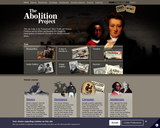
This site looks at those who fought for the ending of the Transatlantic Slave Trade and the emancipation of enslaved Africans in the British colonies. The site has been designed to provide background information, lesson ideas and tools for teachers and learners.

Containing more than 50 articles from the award-winning Tar Heel Junior Historian magazine and over 40 lesson plans, this multidisciplinary Educator Notebook will enrich your exploration of North Carolina and American history with diverse perspectives. This resource's link takes you to a very short form that gives you free downloadable access to the complete PDF book.
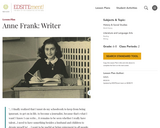
This lesson concentrates on Anne Frank as a writer. After a look at Anne Frank the adolescent, and a consideration of how the experiences of growing up shaped her composition of the Diary, students explore some of the writing techniques Anne invented for herself and practice those techniques with material drawn from their own lives.
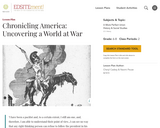
This lesson provides students with tools to analyze primary source newspaper articles about the Great War (1914"“1917) in order to understand public opinion regarding the U.S. entry into the war from multiple perspectives.
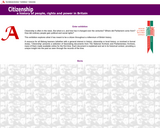
This exhibition explores what it has meant to be a citizen throughout a millennium of British history. Click through to find full documents from each time period, as well as a quiz page.

In this lesson, students will read letters written during the Civil War. Referring to their knowledge about the Civil War, they’ll develop a clear understanding of the message of the letter. They will edit the letters for mechanics and create a dramatic reading based on their letter. Then students will create their own Civil War dramas, using a fictional letter they create.
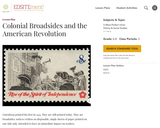
Drawing on the resources of the Library of Congress's Printed Ephemera Collection, this lesson helps students experience the news as the colonists heard it: by means of broadsides, notices written on disposable, single sheets of paper that addressed virtually every aspect of the American Revolution.
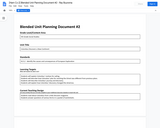
Columbus has an idea, a plan, and an amazing accident!

Students will hear about the economic, political, and social impacts of disease. Students hear about the shifting role of the state when it comes to coping with epidemics. They will listen to renowned U.S historians discuss how people understand the causes and experiences of disease in their own time. The historians delve into the impact of smallpox in New York at the turn of the 20th Century, and explore how diseases ravaged camps of slaves behind Union lines during and after the Civil War. Segments can be listened to seperately.
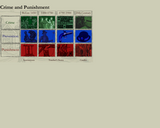
This exhibition covers the themes of crime, prevention, and punishment during different time periods. There are 12 galleries altogether, each with a key question, a worksheet, and a number of case studies.

Why did the German people and the rest of the world allow the Nazi dictatorship to establish itself, label certain groups as "different" or "human", remove individual rights and freedoms from those groups, and violently persecute those sections of society? In this lesson, students explore these questions and more as they use the Holocaust as a context for exploring the dangers of remaining silent, apathetic, and indifferent in the face of oppression of others.
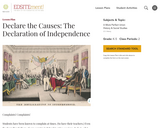
Students read and discuss the Founding Fathers of our country indulgence in gripe sessions. In fact, a list of grievances comprises the longest section of the Declaration of Independence; however, the source of the document's power is its firm philosophic foundation. You can capitalize on the inclination of your students to complain to increase student awareness of the precedents behind the Declaration of Independence. Students will summarize the contributions of the "Founding Fathers" to the development of our county as well as explain how key historical figures exemplified values of American democracy.
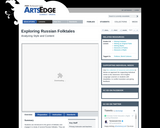
In this lesson, students are introduced to the genre of folktales and engage in a study of several Russian folktales. They are asked to read the tales aloud, and then to fill in a chart about each one. Next, they analyze the charts, answering questions about the folktales’ setting, main characters, and "uniquely Russian" attributes. They also compare and contrast Russian folktales with folktales they may have heard as young children. The lesson culminates with a writing assignment in which students will analyze the folktales or create their own.

In this lesson, students will view the short documentary about current North Carolina resident Peter Stein, a Holocaust survivor who was born in 1936 in Prague, Czechoslovakia to a Jewish father and a Catholic mother, just two years before Nazi occupation. His father was forced into slave labor and later deported to Terezin (Theresienstadt) - a work and death camp - and managed to survive, but his family of eight were all killed. Through the platform of Peter’s moving story, students will explore the realities of life in Terezin, while comparing this to the 1944 propaganda campaign Hitler launched with Terezin at its core. Based on Peter’s insights and words of wisdom, students will then explore what they believe the most important lessons of the Holocaust are by creating their own mural.
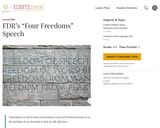
One of the most famous political speeches on freedom in the twentieth century was delivered by Franklin Delano Roosevelt in his 1941 State of the Union message to Congress. This lesson examines the rhetorical use of "freedom" with the objective of encouraging students to glimpse the broad range of hopes and aspirations that are expressed in the call of and for freedom.
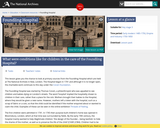
This lesson examines primary sources from the Foundling Hospital in London and poses questions about how things were run and what life was like for a child under their care.
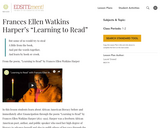
In this lesson students do a close reading of “Learning to Read,” a poem by Francis Watkins Harper about an elderly former slave which conveys the value of literacy to blacks during and after slavery. The activities also prompt students to examine the nature of literacy in the 21st century and the value they put upon it.
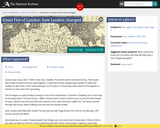
This lesson discusses the Great Fire of London in 1666 and its causes as well as its repercussions long after.